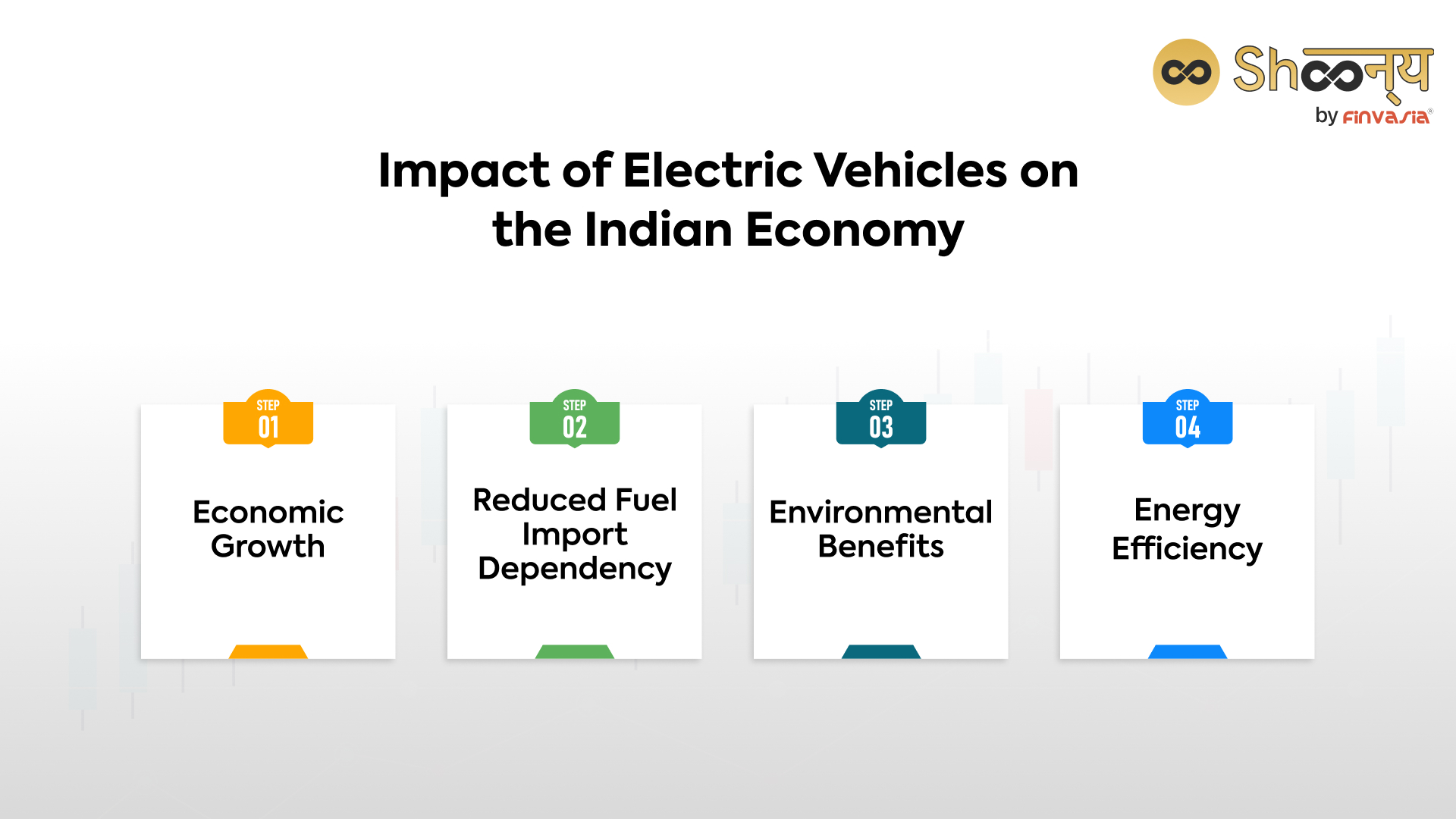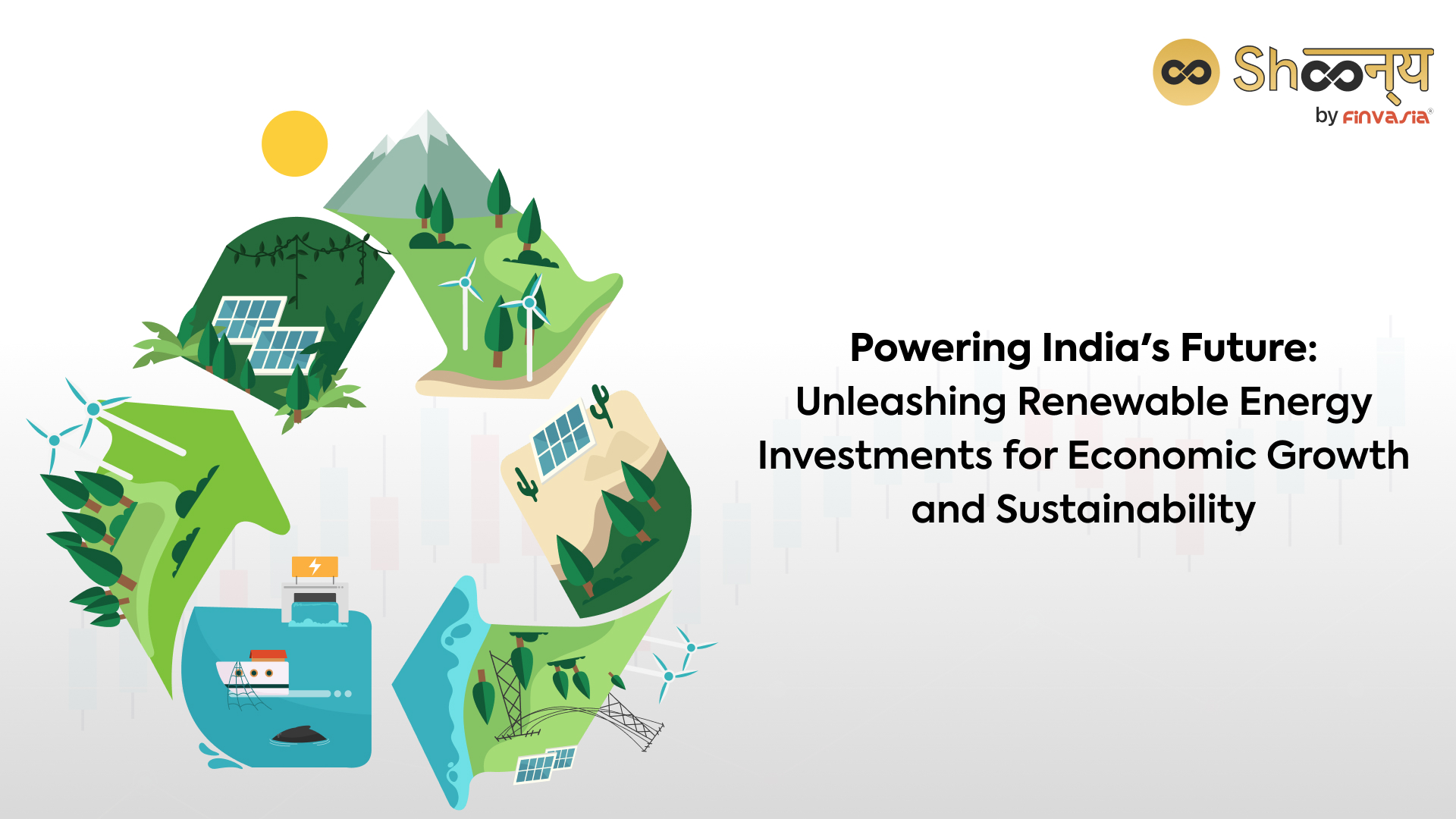The Indian government has taken significant initiatives to promote the adoption of electric vehicles (EVs) in the country. Recognising the transportation industry’s contribution to air pollution, the government has implemented measures at the national and state levels. However, India still has a low adoption rate compared to other countries like China. To address this, the government has introduced financial incentives and schemes, such as the Production-Linked Incentive (PLI) scheme. This scheme provides subsidies to EV buyers and supports the development of battery and vehicle component industries. The government’s aim is to achieve 30% EV penetration by 2030, driven by the growing expense of oil imports, rising pollution, and global commitments to combat climate change.
Renewable Energy Growth in India
Renewable energy has emerged as a vital sector for India, serving as a catalyst for economic growth and a means to achieve environmental sustainability. With an ambitious target of reaching 500 GW of renewable energy capacity by 2030, accounting for approximately 40% of the country’s total power capacity, India is making significant strides in its clean energy transition. Impressively, India has already surpassed its goal of achieving 40% installed electric capacity from non-fossil fuel sources ahead of schedule.
Renewable Energy Investments in India
Renewable energy investments present lucrative opportunities for both domestic and international investors in India. The global renewable energy market reached $881.7 billion in 2020 and is estimated to reach $1,977.6 billion by 2030, growing at a CAGR of 8.4%. As per IEA- International Energy Agency, renewable energy will account for almost 90% of global electricity generation by 2050, with solar and wind energy leading the way.
Investment Options in Renewable Energy
Investing directly in renewable energy stocks offers an avenue for investors to participate in the sector’s growth. However, researching individual companies requires expertise and knowledge of the renewable energy market.
There are multiple options, such as green bonds and sustainability bonds.
To make renewable energy investments at zero brokerage, try Shoonya. This online multi-asset trading platform offers zero-commission trading facilities for shares, stocks, equities, bonds, mutual funds, ETFs, etc.
Alternatively, Exchange Traded Funds (ETFs) provide a convenient option for investing in renewable energy. Clean energy ETFs offer exposure to a diverse portfolio of companies in the renewable energy sector.
Understanding Electric Vehicles in the Indian Economy
Electric vehicles are revolutionising the transportation sector in India and have the potential to transform the country’s economy. Unlike hybrid vehicles, which combine a gas-powered combustion engine with an electric motor, EVs rely solely on high-powered electric motors fueled by large batteries. EVs offer several advantages, including reduced noise pollution, smoother acceleration, and regenerative braking that minimises the need for frequent braking. Safety-wise, EVs tend to have a lower centre of gravity and a lower risk of fires or explosions compared to conventional vehicles.
Government Initiatives for Electric Vehicles In India
The Indian government has been proactive in promoting the adoption of electric vehicles through various initiatives and incentives. Programs like the Faster Adoption and Manufacturing of Electric Vehicles (FAME) scheme provide financial incentives for EV adoption, including subsidies for EV purchases and the development of charging infrastructure. The government’s commitment to electric mobility aims to reduce carbon emissions, combat air pollution, and create a sustainable transportation ecosystem in the country.
Difference between EV and Hybrid Vehicles
- Power Source: Electric vehicles (EVs) run solely on electric power and are powered by rechargeable batteries, while hybrid vehicles combine an internal combustion engine with an electric motor.
- Emission Level: EVs produce zero tailpipe emissions, resulting in lower pollution and reduced carbon footprint. Hybrid vehicles still produce some level of emissions, though typically lower than conventional internal combustion engine vehicles.
- Fuel Consumption: EVs rely solely on electricity, which can be obtained from renewable sources. Hybrid vehicles use both gasoline or diesel fuel and electricity, with the ability to switch between power sources.
- Driving Range: EVs generally have a limited driving range, depending on battery capacity, while hybrid vehicles have a longer range due to the presence of an internal combustion engine.
- Charging vs Refueling: EVs require charging at dedicated charging stations or home chargers, while hybrid vehicles can be refuelled at gas stations like conventional vehicles.
Boosting Electric Vehicles in India: Budget 2023-24 Initiatives
Pushing the renewable energy growth in India, the electric vehicle (EV) sector has experienced remarkable growth, with over 1.3 million EVs on the road as of July 2022. It is evident that the future of the automotive industry lies in electric vehicles.
Recognising this, Budget 2023-24 has allocated a significant sum of Rs. 51.72 billion (approximately USD 631 million) for the Faster Adoption and Manufacturing of Electric Vehicles (FAME-II) scheme. This scheme aims to provide incentives to manufacturers to produce EVs and promote infrastructure development.
Tax Exemption for EV Vehicles
The budget has extended the concessional duty on components of lithium-ion batteries for another year, further supporting the growth of the EV sector. Furthermore, the reduction of indirect taxes from 21% to 13% will provide a boost to the affordability and accessibility of electric vehicles in India.
These budget initiatives demonstrate the government’s commitment to accelerating the adoption and manufacturing of electric vehicles, paving the way for a greener and more sustainable transportation future.
One notable development is the extension of the interest deduction on loans taken to purchase EVs. Previously, this deduction was available until March 31, 2023, with a maximum limit of Rs 1.5 lakh per year. However, the budget has now extended this benefit until March 2025.
Impact of Electric Vehicles on the Indian Economy

1. Economic Growth: The increased adoption of electric vehicles (EVs) in India can stimulate economic growth by creating new job opportunities in the EV manufacturing sector, battery production, and charging infrastructure development.
2. Reduced Fuel Import Dependency: EVs can help reduce India’s dependency on imported fossil fuels, leading to cost savings and improved energy security.
3. Environmental Benefits: Electric vehicles produce zero tailpipe emissions, contributing to cleaner air and mitigating the impact of vehicular pollution on public health and the environment.
4. Energy Efficiency: EVs are more energy-efficient compared to internal combustion engine vehicles, leading to lower energy consumption and reduced greenhouse gas emissions.
Conclusion
In conclusion, India’s dedication to renewable energy and the widespread adoption of electric vehicles reflect its commitment to building a sustainable and eco-friendly future. The government’s proactive measures, such as the Production-Linked Incentive (PLI) scheme and the Budget 2023-24 initiatives, are propelling the growth of these sectors. With ambitious targets, India is poised to emerge as a global leader in renewable energy investments, attracting both domestic and international investors. By harnessing the power of renewable energy sources and embracing electric vehicles, India is revolutionising its economy, reducing environmental pollution, and paving the way for a more sustainable energy landscape.
Key Takeaways
- India is making remarkable progress in renewable energy expansion, aiming to achieve a capacity of 500 GW by 2030.
- Renewable energy investments offer enticing opportunities for both local and international investors.
- The government’s initiatives and incentives actively promote the adoption of electric vehicles and the development of charging infrastructure.
- Electric vehicles have the potential to drive economic growth, decrease reliance on imported fuels, and deliver environmental benefits.
- EVs and hybrid vehicles differ in terms of power source, emissions, fuel consumption, driving range, and charging/refuelling requirements.
- Budget 2023-24 introduces substantial funding to stimulate the adoption and production of electric vehicles.
- The extension of interest deductions on EV loans and the reduction in indirect taxes contribute to making electric vehicles more affordable.
- The growth of renewable energy and electric vehicles aligns with India’s commitment to combat climate change and foster sustainable development.
- Investing in renewable energy stocks or clean energy ETFs enables investors to capitalise on the sector’s immense growth potential.
FAQs
EV vehicles are more efficient than ICE (Internal Combustion Engine) vehicles because they run solely on electric power, eliminating the energy losses associated with burning fossil fuels. EVs convert a higher percentage of stored energy into forward motion, resulting in improved energy efficiency.
India currently faces challenges such as limited charging infrastructure, high upfront costs of EVs, range anxiety due to limited driving range, and the need for a robust manufacturing ecosystem for EV components and batteries.
Yes, the future of electric vehicles in India is becoming increasingly cost-effective. The Indian government has implemented financial incentives, subsidies, and reduced taxes to make EVs more affordable. Additionally, with technological advancements and economies of sale, the cost of EVs is expected to decrease further.
Electric vehicles offer several benefits, including zero tailpipe emissions, reduced air and noise pollution, improved energy efficiency, lower operational costs due to cheaper electricity compared to fuel, and the potential to reduce dependency on imported fossil fuels.
The Electric Vehicle market can drive economic growth in India by creating job opportunities in the EV manufacturing sector, battery production, and charging infrastructure development. Additionally, the adoption of electric vehicles can reduce India’s dependence on imported fuels, resulting in cost savings and improved energy security.
______________________________________________________________________________________
Disclaimer: Investments in the securities market are subject to market risks; read all the related documents carefully before investing.

